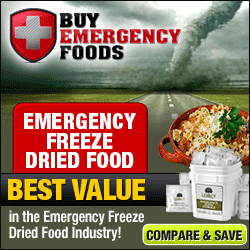No one knows what disaster will look like. Science fiction writers and movie makers have been imaging it for years, scientists have ideas about what it will look like, but no one knows for sure. The only thing that is certain is that food will be difficult to get, and you will be hungry. That simple fact is why stored food along with water is the most important part of any emergency plan. Whether you are planning for a snowed-in week or a full on Zombie apocalypse, you will need food.
Everybody Will Want Food
When thinking about food storage, it is important to keep in mind that everybody will want food during an emergency. That means that if the grocery stores are still open, there will be incredibly high demand, and this will drive the prices up. The potential for high prices during an emergency is certain, but there is no guarantee that the stores will even be open. During a food storage, you should have enough food on hand to feed yourself, your family, and any close neighbors or friends.
Know The Length Of Your Disaster Plan
The amount of food that you decide to store will depend upon how well prepared you want to be. If you are preparing for a simple storm, you will probably be okay with three days worth of supplies. However, if you anticipate a more intense emergency or if you are truly worried about an emergency food shortage, you should have at least 30 days worth of food on hand. People who have six months to a years worth of food on hand will be the best equipped to handle any disaster that encroaches upon them.
Know The Right Kind Of Food To Store
The food that you store is almost as important as how much you store. Ideally, you want to select foods that do not need to be refrigerated. For best results, you should also store food that is lightweight and easy to transport. This allows you to leave your home if the disaster necessitates that. You may be able to cook your meals on the stove or in the oven as usual. However, it is more likely that you will be forced to cook over a fire or eat raw foods. For this reason, you should try to store foods that will taste good cold. You may be able to re-hydrate some dishes, but you should plan for water shortages by storing foods that do not need a lot of water added to them.
Learn How To Store Nutritious Foods
The food that you select will have a direct impact on your health. If possible, you need to select a range of foods to accommodate your nutritional needs. To ensure that you have the right amount of vitamins, you should store canned fruits and vegetables. You may also consider adding vitamin powders to your supply. For energy, you need high protein and low fat foods. These can include lean canned meats, nut butters, nuts, and protein bars. Starches will help you to feel full, and for this, you should have potatoes, rice, or other starches on hand.
Food is the key to being prepared for an emergency, and with a little advance planning, you can greet any emergency easily.
Kari Ann is a freelance writer who loves to get ideas from DailyBread.com - Find gourmet food storage.









